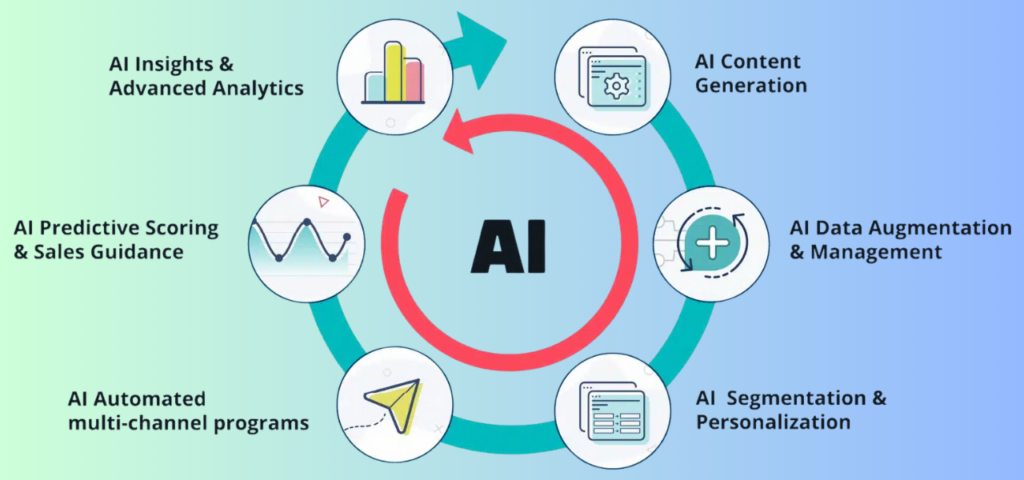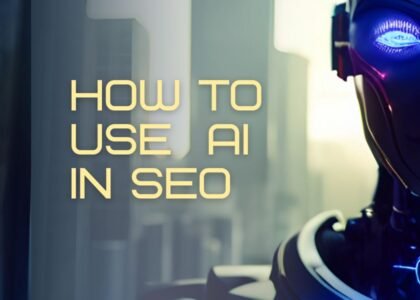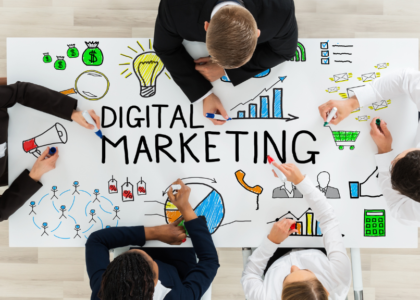AI is defining marketing, empowering smarter, efficient, and personalized campaigns. Businesses that relied on manual marketing techniques are now using AI in marketing to automate processes, examine customer behavior, and optimize advertising in real time. AI changes the way brands communicate with their audiences-from AI-powered chatbots, personalized content recommendations, predictive analytics, and programmatic advertising.
AI enables marketers to run complex campaigns in fewer customized touches, with lower cost and without a great deal of manpower. AI-based services examine vast amounts of data, predict consumer trends, and create effective content with negligible human help. It can automate email marketing, scale social media campaigns, and support customer engagement with AI-powered chatbots, which provide the business with a significant strategic advantage.
In this article, we will examine the ways that AI is making digital marketing an expanding discipline, trends that can be expected into the near future, and ethical predicaments that have to be upheld by businesses. Both startups and established brands would benefit by getting a better handle on the role of AI throughout digital marketing if they desire to keep one step ahead of their competition and find better returns on their marketing efforts.
Table of Contents
ToggleThe Role of AI in Marketing
How AI Enhances Customer Insights and Behavior Analysis?
Artificial intelligence equips businesses with the means to analyze huge amounts of customer data in a bid to glean insights into their behaviors, preferences, and needs. Such machine learning algorithms will enable AI tools to keep a better check on a user’s activities, understand their likely buying behavior, and design much more pointed marketing campaigns behavior.
For instance, an AI-driven analytics tool can assess customers on which products they are more likely to buy and make personalized recommendations. This would help the business optimize its marketing and increasing conversion rates.
AI-Driven Automation in Marketing Campaigns

AI-enabled automation assigns most of the manual tasks to computers so that marketers spend less effort on tasks that are repetitive, like sending emails, social media posting, or nurturing leads. Business can now use AI to perform simple tasks, such as setting an automatic response, sending reminders, and even altering content dynamically in real time, depending on customer engagement.
For example, such tools, like HubSpot and Marketo, automatically schedule social media posts, send out targeted emails, and engage in high-level analysis that frees marketers to concentrate on strategy rather than executing procedures.
Personalization and AI-Based Recommendations
Personalization is central to digital marketing success. AI looks at the gathered customer data to provide personalized recommendations that are tailored to certain tastes. AI-led personalization basically ensures that what customers receive in terms of content, product suggestions, and advertisement is within their interest.
Netflix and Amazon are great examples of AI-powered personalization. Their recommendation engines analyze past behaviors and suggest relevant content, increasing engagement and sales.
AI-Powered Marketing Strategies
AI-Generated Blog Posts
For some time now, writing engaging, SEO-optimized blog posts has demanded time, research, and writing skills. Today, AI-powered writing tools like Jasper AI, Copy.ai, and Writesonic have all changed the game in creating high-quality content in second- they work on the basis of Natural Language Processing(NLP), crafting well-structured, human-like texts from inputs like keywords, topics, and writing styles.
How AI Blog Writing Works
- The user enters a topic, a brief outline, or some key phrases.
- The AI processes the input and generates a draft blog post with headings, subheadings, and engaging content.
- The user can review, edit, and refine the content before publishing.
Best AI Writing Tools for Blog Posts

- Jasper AI – Great for long-form blog posts, product descriptions, and ad copy.
- Copy.ai – Ideal for quick content like captions, headlines, and short blog posts.
- Writesonic – Generates SEO-friendly blog posts, landing pages, and product descriptions.
- Rytr – Affordable AI writer for businesses on a budget.
AI-generated blog posts are an excellent way for businesses to scale their content marketing efforts, ensuring they always have fresh and relevant content for their audience.
AI-Powered Video Creation
Various AI platforms offer Synthesia, Lumen5, and Pictory allow for professional-grade videos extracted from simple text. The use of artificial intelligence in video production presents an opportunity for speeding up the construction and production of animations, voiceovers, and video scripts in a very efficient way.
How AI Video Creation Works
- The user inputs a script or selects key bullet points.
- AI processes the text and selects relevant video clips, animations, or stock footage.
- AI-generated voiceovers or avatars narrate the content.
- The final video is rendered and ready for publishing.
Popular AI Video Creation Tools

- Synthesia – Uses AI-generated avatars and voiceovers to create professional marketing videos.
- Lumen5 – Converts blog posts into engaging social media videos.
- Pictory – Uses AI to summarize long-form content into bite-sized video clips.
- InVideo – Provides AI-assisted video editing and script-to-video automation.
AI-powered video tools are a game-changer for businesses looking to leverage video marketing without investing heavily in production costs.
AI for Image and Graphic Design
AI is impacting the creation of attractive images and graphics for marketing campaigns in yet another area. AI design tools allow companies to create customized graphics, social media images, or even digital artworks with minimal manual work.
AI Tools for Image and Graphic Design
- 🖼 Canva – Uses AI-powered templates and design suggestions.
- 🖼 Runway ML – AI-generated image enhancement and editing.
- 🖼 Deep Dream Generator – AI-assisted artistic transformations.
- 🖼 DALL·E – Generates unique, AI-created images from text prompts.
AI-powered design tools empower businesses to produce high-quality visuals for social media, websites, and advertisements effortlessly.
AI-Powered Content Curation
Beyond content creation, AI also assists marketers in curating appropriate content for their audiences. Content curation is the process of selecting and sharing the right blend of high-quality articles, videos, and social media posts from third-party content to build authority and engage followers.
How AI Helps with Content Curation
- 🔍 Identifies Trending Topics – AI tools like BuzzSumo scan the internet for trending articles in your industry.
- 🔍 Suggests Relevant Content – AI recommends blog posts, infographics, and videos to share with your audience.
- 🔍 Automates Social Media Sharing – Tools like Curata and Feedly automatically schedule curated content.
By integrating AI-driven content curation into their strategies, businesses can enhance engagement and authority without creating all content from scratch.
AI for Email Marketing and Automation

AI-driven email marketing tools optimize campaigns by analyzing user behavior and engagement. AI can determine the best time to send emails, personalize subject lines, and segment audiences to improve open rates.
For instance, AI-powered email marketing tools like Mailchimp and ActiveCampaign use predictive analytics to optimize email campaigns, increasing customer retention and sales.
AI Chatbots and Virtual Assistants
AI chatbots promote customer interaction by providing instant contact, answering common queries, and offering assistance in shopping. Companies adopt AI chatbots to extend their customer care approach and thus attract more people without any extension or reinforcement to their support staff.
AI chatbots are integrated for exceptional customer service through Drift, ManyChat, and Tidio. Businesses use it to maximize satisfaction and boost conversion rates.
Enhancing Customer Engagement with AI
AI-Driven Social Media Marketing
AI helps businesses become aware of developing trends, times to post, and how to write captions with higher efficiency on social media. Applications such as Sprout Social and Hootsuite use collected data to suggest components such as the best content, topics, and times to post.
Predictive Analytics and Consumer Targeting

Predictive analytics allows marketers to anticipate customer needs before they occur. AI tools analyze historical data and recognize patterns which can assist businesses in targeting the right audience with the right message.
Google Analytics and IBM Watson employ AI to provide deep insight into user behavior which helps in refining a business’ marketing strategy.
AI-Powered Voice Search Optimization
With increased usage of voice search, AI-powered voice recognition tools assist businesses in optimizing their content for voice queries. Voice search optimization ensures businesses are returned in search results when users ask questions through Siri, Alexa, or Google Assistant.
AI in Advertising and Paid Campaigns
Management of Pay-Per-Click Campaigns with AI
AI automates PPC campaign management by analyzing bid strategies, identifies high-performing keywords, and enhances ad placement. Google Ads and Facebook Ads employ AI to enhance targeting and get maximum ROI.
AI-Based Bidding and Ad Optimization
Bidding strategies using AI ensure that businesses will always be served their placements at the lowest possible cost. AI-based smart bidding tools review real-time data and adjust ad spending to maximize conversions.
Programmatic Advertising and AI
AI in programmatic advertising is utilized in real-time to buy and place ads. Automated systems make sure businesses reach their intended audience at the right time, allowing for maximum placement with the least waste of ad spend.
Emerging AI Trends in Digital Marketing

As AI-driven marketing is constantly evolving, there are also some very cool emerging AI trends in digital marketing to look out for to get the competition on their toes.
AI-Generated Telescoping Influencers
Influencer marketing has been one of the core marketing strategies in digital marketing, while AI is making it better with AI influencers. They are those completely virtual personas created using AI and machine learning and are supposed to interact with their audience as human influencers would.
- Examples of AI Influencers:
- Lil Miquela: A virtual influencer with millions of followers on Instagram, collaborating with brands like Prada and Calvin Klein.
- Shudu Gram: A digital supermodel promoting fashion brands and appearing in major campaigns.
- Advantages of AI Influencers:
- They are highly customizable and can be tailored to fit brand aesthetics perfectly.
- No risk of scandals or unpredictable behavior.
- Available 24/7 for brand promotion and engagement.
As brands explore the potential of AI influencers, we can expect a rise in virtual brand ambassadors replacing traditional social media personalities.
AI-Powered AR/VR Experiences
Augmented Reality/Virtual Reality in digital marketing is growing extremely popular, and AI is adding to their strength. The combination of AI with AR/VR can provide the brands with experiential and interactive marketing experiences, whereby an immersive interaction will take a stronger hold on customers.
Use Cases of AI-Enhanced AR/VR in Marketing
- Virtual Try-Ons: AI-powered AR allows customers to see how clothes, makeup, or accessories will look on them before making a purchase. Brands like Sephora and Nike are already using this technology.
- Virtual Showrooms: Companies like IKEA and Wayfair use AI-driven AR to let customers visualize furniture in their homes before buying.
- AI-Powered VR Shopping: Virtual malls and AI-powered shopping assistants are revolutionizing e-commerce by creating personalized, interactive shopping experiences.
Being facilitated with AI technologies in AR or VR, brands will now be able to provide deeply immersive and personalized customer experiences, boosting conversion rates and brand loyalty.
AI in Interactive Marketing Campaigns

AI deals with making digital marketing campaigns much more interactive, engaging, and personalized. Traditional one-way advertising is phasing out into AI-interactive experiences that grab customers’ attention and generate further engagement.
Examples of AI in Interactive Marketing
- AI Chatbots for Engagement: Brands use AI chatbots to interact with customers in real time, answering questions, providing recommendations, and enhancing the shopping experience.
- Gamified AI Campaigns: Companies create AI-driven quizzes, games, and challenges that engage users and encourage social sharing. For example, McDonald’s has used AI-powered gamification in its mobile app to increase customer interaction.
- AI-Driven Video Personalization: Platforms like Synthesia allow brands to create AI-generated personalized video messages for customers, improving customer engagement and conversion rates.
Interactive AI-powered marketing campaigns make customers feel more connected to brands, increasing trust and customer loyalty.
Ethical Considerations and Challenges of AI in Marketing
While AI offers immense opportunities, it also brings significant ethical concerns and challenges that businesses must address. Misuse of AI can lead to privacy violations, biased decision-making, and ethical dilemmas in advertising.
Data Privacy Concerns
AI relies heavily on data collection and analysis to personalize marketing campaigns, but this raises concerns about how customer data is handled.
- Challenges:
- AI systems collect vast amounts of personal data, raising privacy concerns.
- Data breaches and cyberattacks put customer information at risk.
- Lack of transparency in how AI algorithms use data can lead to mistrust.
- Solutions:
- Implementing strict data protection regulations (e.g., GDPR, CCPA) to ensure responsible AI usage.
- Using AI-powered security measures to protect user data from cyber threats.
- Providing customers with clear options to control their data privacy settings.
Businesses that prioritize ethical AI practices and data protection will gain customer trust and avoid legal repercussions.
Bias in AI Algorithms
AI systems learn from existing data, which means they can inherit biases present in that data. If not properly managed, AI-driven marketing campaigns can unintentionally discriminate against certain groups.
- Examples of AI Bias in Marketing:
- AI-powered hiring tools have been found to favor certain demographics over others.
- AI-driven ad targeting may unintentionally exclude specific age groups, genders, or ethnicities.
- Solutions:
- Using diverse and representative data sets to train AI models.
- Regularly auditing AI algorithms to detect and remove biases.
- Implementing fairness-aware AI frameworks to ensure ethical decision-making.
Addressing AI bias is crucial for ensuring inclusive and fair marketing practices that do not alienate any customer segment.
Ethical Use of AI in Advertising
AI enables highly personalized advertising, but if misused, it can lead to deceptive marketing practices and consumer manipulation.
- Challenges:
- AI-driven ads can track users across websites, raising concerns about intrusive surveillance.
- Some AI-generated content can be misleading or fake, creating ethical dilemmas.
- Deepfake technology can be misused to create deceptive promotional content.
- Solutions:
- Establishing ethical guidelines for AI-generated advertisements.
- Ensuring transparency in AI-driven marketing campaigns by disclosing the use of AI.
- Avoiding manipulative advertising tactics and respecting consumer consent.
Marketers must balance AI’s capabilities with ethical responsibility to maintain customer trust and brand integrity.
Embracing AI Responsibly in Digital Marketing
The future of AI in digital marketing seems replete with amazing possibilities, ranging from the emergence of AI-generated social media influencers to interactive campaigns and immersive AR experiences. But as AI has grown more powerful, companies must also work to address the ethical challenges brought ahead by AI.
By following responsible AI practices, organizations can harness the potential of AI for creating innovative, effective, ethical marketing campaigns which engage customers and earn their trust. Ideal is the balance somewhere between automation and personalization and between ethical transparency and respect for their data protection needs.
As AI continues into the new age, companies implementing these technologies responsibly will reap the benefits that will keep them ahead in the competitive digital marketing landscape.












